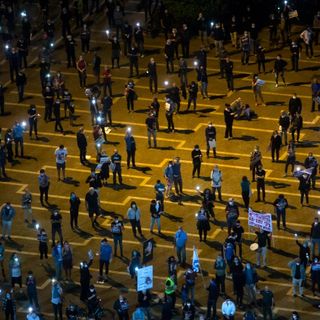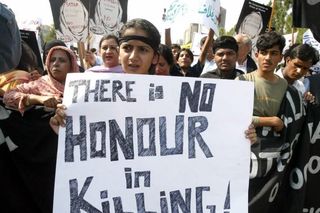
Why India Needs a Separate Law for Honor Killings
Because honor killings take place at an intersection of motives — caste, religion, ethnicity, class — there must be a separate law that addresses the common link between them.

In India, even amid a nationwide lockdown, the practice of honor killing reared its ugly head in the southern state of Tamil Nadu last week. With the Covid19 pandemic rendering jobs scarce, M. Sudhakar, 24, was forced to return to his village of Morappan Thangal, where he was murdered by his wife’s father and another relative. The couple, who had eloped and married six months ago, had been forcibly separated, unlawfully, by a local panchayat for marrying outside their castes. For inter-caste couples in India, these tragic consequences are the norm, but whether Sudhakar’s murder will be recorded for what it was — an honor killing — is doubtful.
Honor killings are notoriously underreported – not by the media, but by the State. India’s latest National Crime Records Bureau (NCRB) report recorded only one instance of honor killing in 2018 in the country, in Delhi. The year before, it again recorded only one case, this time in Surat, Gujarat. According to the report, there were no such cases in Tamil Nadu during both years.
However, in the last five years, according to field investigations and studies by Evidence, an NGO working to protect the human rights of Dalit and Tribal people in Tamil Nadu and Puducherry, there have been 195 known cases of honor killings in Tamil Nadu alone. In November 2019, for instance, two horrific instances of honor killings took place in the southern state in the span of a single week: 17-year-old Janani from Nagapattinam was set on fire by her mother for being in a relationship with a Dalit man. Five days later, 21-year-old Nambirajan’s decapitated body was found on the railway tracks in Tirunelveli. He had been killed by his in-laws, who simply could not accept his lower-socioeconomic class status, even though he belonged to the same community.
The annual NCRB report is prepared by the Center, with data provided by states and union territories. According to the NCRB, the data is first validated at the Police Station/District level and validated a second time during the consolidation of district data by the State Police. If this is indeed the method followed, then one of two things — or both — are likely true: either state governments have no reliable means to track honor killings, or they prefer not to.
The trouble with tracking honor killings
Human Rights Watch defines honor killings as “acts of violence, usually murder, committed by male family members against female family members who are perceived to have brought dishonor upon the family by being romantically involved with or choosing to marry men outside their caste, class or religion.” In India, women constitute almost 97 percent of honor killing victims, according to activist Kathir Vincent, director of Evidence. The lack of a specific law to deal with these particular crimes, in which ‘honor’ is the common motive, results in them being reported under myriad laws, making them nearly impossible to track. Honor killings are often reported by relatives as suicides, with family members destroying any evidence to the contrary in the name of immediate cremation, as in the case of a minor girl’s murder by her family in Redlapalle village, Andhra Pradesh in October 2019. Or, they are treated as homicides by the police, or as atrocities against scheduled castes and tribes, since lower-caste men who are involved with upper-caste women are the next-most vulnerable group to honor killings, Vincent says.
The best available data related to honor killings tells us nothing about the act’s prevalence – only about how many people are at risk. In 2018, 10,773 people eloped due to their “love relationships” according to the NCRB. Couples who elope generally do so because they face familial disapproval of their relationships over differences in their class, caste or religion – thus leaving them more vulnerable to violence on the same grounds.
Related on The Swaddle:
Mothers‑in‑Law Restrict Women’s Reproductive Agency by Isolating Them: Study
The fallout of unreliable data
In 2012, the Law Commission submitted a report outlining a unique legal framework for dealing with honor killings. The Prohibition of Interference with the Freedom of Matrimonial Alliances Bill was aimed at curbing activities and behaviors associated with honor crimes by criminalizing, for example, the unlawful assembly of groups of people for the purpose of condemning a marriage, and criminal intimidation of a couple. It also recommended punishments, protection measures for vulnerable couples, and counseling and legal awareness for couples. Sadly, this Bill was not brought up by an MP in Parliament.
In July 2019, when Thol. Thirumavalavan, an MP from Chidambaram, asked for the status of the Bill in the Lok Sabha, the Minister of State, Nityanand Rai, alluded to the last NCRB report — and its grossly underreported numbers — as the government’s official point of reference, maintaining that existing provisions in the Indian Penal Code were sufficient to deal with honor killings.
Vincent says the lack of reliable data on honor killings, and the resulting underestimate, is a convenient scapegoat – the real reason for the delay in introducing dedicated legislation is because of how it will affect vote banks. “Social groups like the Khap Panchayats have considerable sway on political outcomes and that’s what politicians are afraid of upsetting if they back such a bill. The groups that have the most to gain from the perpetuation of the caste system are the ones who hold the most power in the existing system,” Vincent says. The same could be said for those who perpetuate religious divides, as well.
The underestimate also justifies institutional reluctance to enact what few resources the State does (or is meant to) provide to at-risk couples. In 2018, the Supreme Court condemned honor killings and issued directives like setting up special cells across the country to take calls from couples in distress. In Tamil Nadu, Evidence says the effort is a sham. “There’s not even an allocated staff or budget; it’s just one constable sitting at a telephone,” says Vincent. In 2019, the Madras High Court, following a suo motu public interest litigation petition on the status of these directives, dismissed a status report filed by the Director-General of Police, J.K. Tripathy, claiming that awareness campaigns about honor killings were being conducted across Tamil Nadu, through the distribution of pamphlets and erection of flex boards. However, when asked by the court, even the police officer who had filed the report, conceded that not even one such flex board had been erected in Chennai city.
But even reliable data is not enough
Even if the government were to enact a dedicated honor killing law, it would still have to be enforced. Police cooperation is still near absent when attempting to seek justice for an honor killing, says Barathi, founder of Kadhal Aran, an app that helps inter-caste couples facing familial harassment by providing mediation, counseling, safe houses, and legal help. While some police outright refuse to register a complaint, others might emotionally harass someone into changing their minds. “If the chief inspector has a daughter, he might be less willing to cooperate, as he most often has the same views about caste and honor as the rest of the society,” Barathi adds. In other parts of the country, religious biases prompt similar responses from police.
Which is why Barathi advocates for a suite of honor crime laws that absolutely define and deal with crimes of this particular nature.
“Honour crimes are usually not one-off incidents; there’s a lot that comes before the murder like verbal harassment, physical assault, coercion, and kidnapping. Having a separate law would define the things leading up to these crimes,” and help prevent loss of life, he says.
In August 2019, the Rajasthan Assembly passed the Rajasthan Prohibition of Interference with the Freedom of Matrimonial Alliances in the Name of Honour and Tradition Bill 2019, making it the first state to have a special law for honor killings. Now crimes – including but not limited to killing — motivated by honor are non-bailable offenses in the state, punishable by death or a life sentence, in addition to a fine of up to 5 lakh rupees, setting a hopeful precedent to introduce dedicated legislation at the Centre.
Such a dedicated law at the centre would provide not only more reliable data, and an urgency and effectiveness to protect couples at-risk of honor crimes — but also reveal society’s depth of division around religion and caste. This could explain why some deny the need for dedicated honor crime laws with the same violence and apathy used to condemn intercaste and interreligious marriage – both herald the eventual breakdown of ugly and outdated fault lines and the advent of a more equal society.
“Caste is not as big a problem for love, it is the other way around — and that’s why it scares people enough to kill,” says Vincent.
Anugraha Sundaravelu is a journalism student based in London. She writes about gender, culture, and technology with bylines in The Guardian and The Hindu Metroplus. She's powered by caffeine and puppy videos.
Related


Why People Feel the Need to Blame China For the Pandemic
